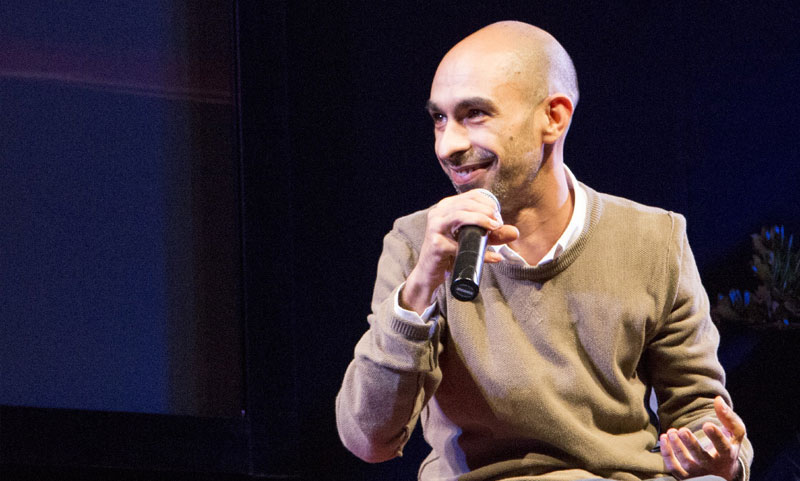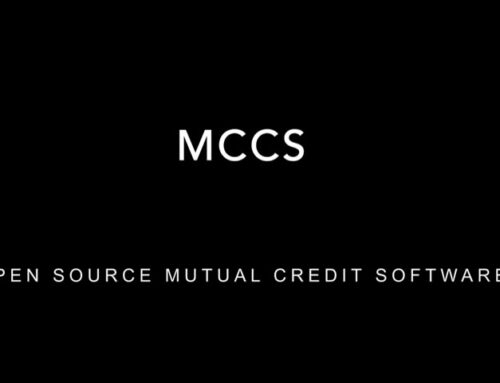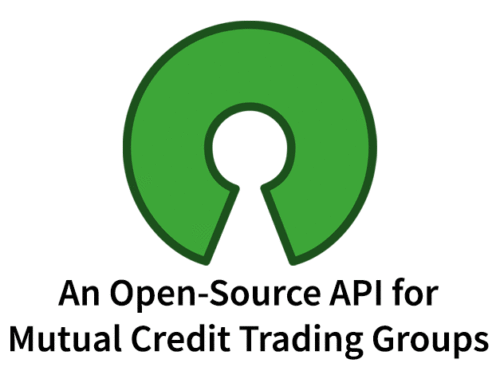On a recent trip to the island of Sardinia I met with Giuseppe Littera, one of the founders of Sardex – one of the most successful mutual credit schemes in Europe, and Paolo Dini, an English LSE affiliate who is working as a consultant with Sardex. Paolo and Giuseppe share an office with desks facing each other in what is effectively the R&D department – there are piles of European financial policy papers on their desks – and scribbled diagrams on the white board on the wall.
Sardex helped its 4000+ members conduct over 40 million euros worth of transactions in 2017, and 43 million in 2018.
The aim of my visit was to find out what lessons Sardex have learned since their inception in 2008 – and to see if there was scope for collaboration. One of Sardex’s key activities, listed on the white board, is taking to others. Despite constant pestering from journalists, researchers and founders of other aspiring mutual credit networks (like me!), they’re happy to share their knowledge. It’s an impressively open attitude and they’re a friendly duo. I kick off, as requested, with some background and context about The Open Credit Network.
The conversation quickly comes to the challenge of building a successful mutual credit network, which also functions as a viable business.
G – “The market teaches you how hard it is… Most people don’t understand money or credit, so you need to explain both. What works is to bring up the social aspect.”
I make a mental note to do more on building the relationships between our OCN members and ask Giuseppe about pricing.
O – “How do you charge your members?”
G – “We’ve tested 58 different pricing plans. Yes, really. I went through and counted them the other day.”
Paolo looks shocked – he clearly didn’t know this either.
“First was monthly fees plus transaction fees… Then we went through any and all combinations of: monthly / yearly / joining / subscription / transaction / fiat vs credit fees / fees just when you buy / just when you sell etc. etc… The right result? It’s highly dependent on context. When Sardex started there was no Direct Debit in Sardinia, or business credit cards – which basically meant we were chasing invoices all the time. So very soon we decided it would be easier to charge upfront yearly membership fees – and not worry about transaction fees.”
I explained that The Open Credit Network is a co-op, and that our plans are to keep fees as low as possible, to allow members to set the fees and to basically only charge what’s required to run the network. We talked about co-ops for a while – including the difficulties and perceptions of these, and the possible benefits…
Giuseppe explained that in Italy there’s a perception that co-op means “non-profit” – and that Sardex is a for-profit company.
G: “There is big proof here. Co-ops here have never worked for many reasons – mainly because they were imported culturally from Italy in the wrong way. Co-ops are also perceived as left-wing. Politics is very polarised here and we wanted to be seen as neutral.
There are only really red and white co-ops here. Red being left-wing and white being the church – both with all the associated trappings…”
I introduced the concept of the multi-stakeholder co-op, using the example of Stocksy – explaining how they are made up of various member classes with different voting rights, and pointed out that co-op does not have to mean non-profit at all.
Giuseppe noted that Sardex always wanted to be a hybrid – both providing value and having an impact.
“We’re first for impact (meaning they want to help small businesses), then for profit. At the start we were targeting sole traders or small micro-businesses. We told them “…relationships matter…” and “…you will win new business…” Then we said “…but you’re not going to get this for free!”
“We did try doing it for free – it was a tragedy! We would explain the proposition and people would say ‘You’re telling me its free? Where’s the catch?’ So then we made it 100 euros a year. We only got taken seriously when we raised fess to 300 euros and explained why we were charging them. We said ‘We need fees to give you a good service! We’re working 9 to 5 to help you with good tools…’ That was back in 2009 / 2010 at the start of Sardex. Because the internet often didn’t work businesses used to fax in copies of their receipts which we then entered into the accounting system. They loved that kind of ‘extra care’.”
Sardex conducted their first trades 9 months after signing up their first business. A fact that made me feel like we must be doing something right to have conducted our first trades just 8 months after first discussing the idea of a UK mutual credit network.
The day before my visit Giuseppe’s brother had been asked to speak in an interview on Sky News as a result of the MiniBOTS press coverage. Giuseppe agreed with me that all the press coverage of alternative currency systems like Libra (the proposed FaceBook currency) is good for Sardex in terms of PR, because it gets them free press.
G: “People say ‘Sardex is the most used and useful complementary currency’ It’s very flattering…”
Sardex does not hold conventional “reserves” to back the currency. It doesn’t need to because it’s mutual credit – and they don’t run any insurance either. All they have is a contract with their members.
I felt like Giuseppe and Paolo were warming to my inquisition so I dug in to the more sensitive questions I was dying to know the answers to.
O: “Do you have defaulters?”
G: “Of course we do – they are going to be there. Credit equals risk. We have defaulting members – someone dies, someone dissolves a company etc. This is a problem, but the question is – How big is it? If it impacts trade it is a genuine problem. Our defaults are probably in line with Italian banks – maybe 5 to 10%. It’s as dangerous as any loan but we’ve managed to not cross boundaries. Debt collection in fiat is the last resort.”
Paolo explained to me how they handle debtors. They have a broker who has gone back over the last 6 years of people who have been in debt for some time (‘bad leavers’) and made a list. Now he’s calling them all, one by one. “Most had forgotten they even had an account” says Paolo. “A lot of them say “OH! so sorry – can I pay you back…? maybe in instalments?” In some cases that doesn’t work – so the broker hands over the file to a debt collection agency, which is still friendly to them. If after a year they have not got anywhere then the plan is to sue, but that hasn’t happened yet – which all points to the benefits of the ‘mutual’ side of mutual credit. Businesses aren’t looking to rip each other, or the network, off – they care about their reputations and will do whatever is required to preserve them.
We talked about limits to growth.
O: “What percentage of the Sardinian economy do you have?”
G: “If we include all the businesses who have come and left maybe about 6%, but within that 30 or 40% are weak links that don’t trade much.”
Paolo: “Right now it’s roughly 3.5 % of all businesses in Sardinia. Half are sole traders (anyone with a VAT number can join Sardex – which includes sole traders) and we have a couple of PLCs including Tiscali.”
G: “Achieving impact means SME’s bottom line or quality of life – if we don’t help either of those then they don’t subscribe next year. Further down the line we would like to share what we have done – to make it (with a nod to Thomas Greco) “locally powered and globally useful…” We have an idea for a scalable architecture, but we want to grow first.”
O: How long will that take?
G: Maybe 5 or 10 years?
P: Could be 3?
I asked about the success of their federation model, which has seen versions of Sardex spring up in several regions of Italy.
G: “Starting one mutual credit network is hard – doing replicas is VERY hard. In some cases Sardex have bought them (their Italian regional replicas) back to avoid them failing, because they were being managed badly by the person in charge.”
We got into a discussion about the big picture and “The Plan” – which was illustrated by a tree drawn on the white board.
The Plan:
- The base layer (“the roots of the tree”) is ‘the infrastructure’.
This would be a public non-profit foundation which deals with notary and identification.
- The layer above (“the trunk of the tree”) is the business layer.
This provides “the platform” and is a for-profit, privately-owned company which specifies certain rules – e.g. that Mutual Credit doesn’t allow interest etc.
- The top layer (“the leaves”) are ‘the communities’.
These would be all the different mutual credit networks around the world, which could be white labeled and called whatever they want.
G: “It’s a hybrid of cloud and blockchain – and some closed and open source parts of code with the bottom layer being mostly open.”
I mentioned That the Open Credit Network’s vision is to enable a “Global Credit Commons” which works in a very similar way.
Giuseppe laughed. “I’m working towards the commons – from where is real now”. He made a strong point about it being great to theorise about mutual credit and what is possible… but that you don’t really know what’s possible unless you try to build a viable trading network – and then you find out how hard it is. I agreed. We’re still learning this through our market building work…
We talked about techniques for explaining and promoting mutual credit.
I explained our experience at the Federation of Small Business in London, who we thought might be open to the ideas of a new means of exchange and interest-free credit for small businesses. That meeting probably deserves another blog post but suffice to say we were almost laughed out of the building with the phrase “…there’ll never be another financial crash; we have quantitative easing now…” ringing in our ears. It would have been funny if it wasn’t so worrying.
Giuseppe and Paolo laughed in solidarity, but were clearly concerned by the ignorance – and the growing London property bubble too…
G – Brexit is the perfect storm for mutual credit to take off in the UK. If the banks crash, mutual credit could really help. In times of financial turmoil the demand would be huge.
Sardex are an inspiration and Giuseppe was extremely generous with his knowledge. When the OCN team and I first discussed kicking off a mutual credit network in the UK, Brexit seemed like a distant and vague concept. Now, one silver lining of Brexit might just be that it creates the perfect storm for mutual credit to gain recognition in the UK. Time will tell.
And if the rest of the global economy tumbles with the UK we might just have the perfect conditions for Giuseppe’s global master plan and a catalyst for a new, collaborative, sustainable economy.





